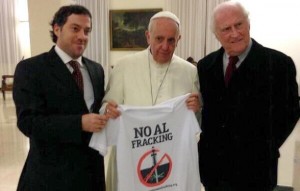From First Things, an interesting take on the pope’s eco-encyclical by R.R. Reno.
Here’s an extract: “Everything is connected” is [the Pope’s] mantra in Laudato Si. True to this principle, Francis links his suspicion of science with suspicions about other dimensions of the modern world. Progress has often been characterized as ever-greater prosperity. But economic globalization, a signature feature of the late modern world, and precondition for today’s rapid growth in China and elsewhere, is excoriated again and again. Francis never tires of denouncing “finance,” by which he seems to mean modern banking in all its forms. And of course we’re destroying mother earth. “The post-industrial period may well be remembered as the most irresponsible in history.”
Another feature of modernity and its faith in progress has been a political commitment to liberty, equality, and fraternity. To be modern is to believe that, for all our flaws, Western societies are more democratic, more egalitarian, and more inclusive than any in history. This is not the Pope’s view. The West is rapacious. He quotes one source approvingly: “Twenty per cent of the world’s population consumes resources at a rate that robs the poor nations and future generations of what they need to survive.”
In effect, the present world system created by European and North American modernity—the world made possible by Newton, Locke, Rousseau, Ricardo, Kant, Pasteur, Einstein, Keynes, and countless other architects of modern science, economics, and political culture—is an abomination. Francis never quite says that. But this strong judgment is implied in his many fierce denunciations of the current global order. It destroys the environment, oppresses the multitudes, and makes us blind to the beauty of creation.
Indeed. And it’s worth noting that these are not the first “fierce denunciations” (I’ll stick with that relatively gentle phrase) that we have seen from a pope with something of a weakness for a demagogic, occasionally even paranoid style that would have played well in the Peronist Argentina of his youth, a time when he clearly learnt much and understood little.
But back to First Things:
Today’s progressives are often critical of the West, and in that sense critical of “progress.” Europeans can be hysterical about genetically modified food. They have renounced nuclear energy, the only feasible large-scale alternative to a hydrocarbon-based energy system. Democracy was the signal political aspiration of modernity, but the EU is a post-national political project, a technocratic, post-democratic project. Here in the United States, many are now educated to believe that the history of the West is one long story of oppression and injustice. Optimism has waned, which means that the pope’s pessimism may be received warmly.
Perhaps, therefore, the most accurate thing to say is that Francis offers a postmodern reading of Gaudium et Spes and Vatican II’s desire to be open to the modern world. He seems to propose to link the Catholic Church with a pessimistic post-humanist Western sentiment rather than the older, confident humanism.
There may be a strange genius in this. For more than two hundred years Catholicism has resisted a self-sufficient humanism confident in the triumph of reason and science. Now there are powerful forces in the West that regard the modern project of the West as a failure, and the worst-case accounts of global warming encourage us to draw this conclusion. Thus the encyclical’s apparent focus, which is quickly superseded by a wholesale critique of every aspect of the current global system. Francis encourages the humiliation of modernity and the West, seeing in its failure the seeds of repentance and return to God.
Count me a skeptic. I prefer that approach of John Paul II and Benedict XVI. If global warming poses a dire threat to humanity—and it may—we will need all the moral strength, scientific integrity, economic vitality, and political legitimacy that Western modernity can muster. The same goes for the pressing problems of poverty and development. Instead of the voice of denunciation, we need the Church’s counsel and guidance. We all need to repent. But when it comes to pressing ethical problems, revolution is a dangerous game to play.
Obviously, I’m not with Reno on the need for the guidance of the Roman Catholic Church (readers may disagree!), but his broader point is subtle and very well made. The fact is that Francis is a pope who is profoundly at odds with not just (what we understand as) the West, but with the best of the West.
And, I would add, this encyclical is far from being the only evidence of that.
Links:
http://www.nationalreview.com/corner/420034/premodernpostmodern-pope-andrew-stuttaford
http://www.firstthings.com/web-exclusives/2015/06/the-return-of-catholic-anti-modernism

